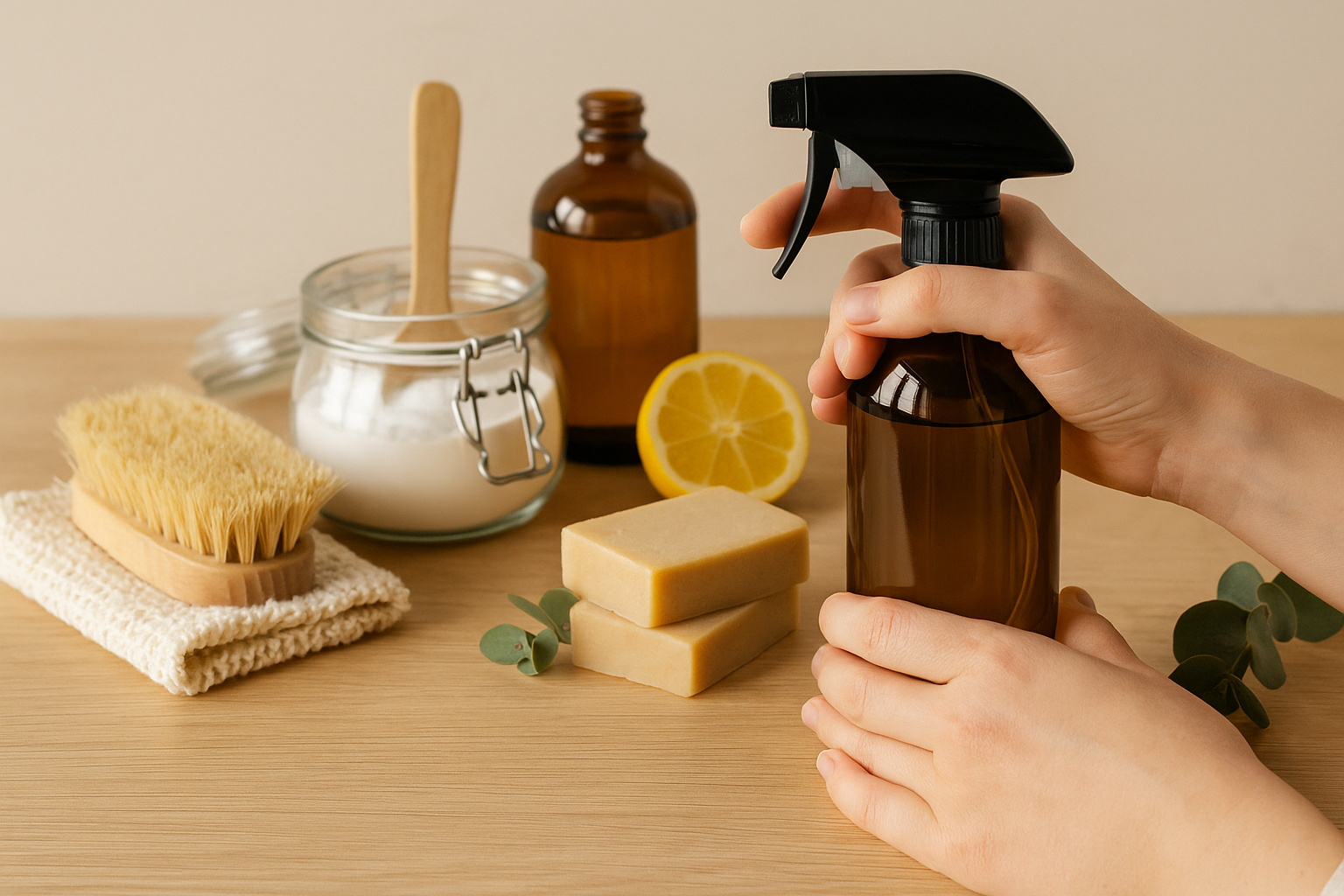Washing dishes is one of those tasks that never ends. Every day, plates, cups, and pans pile up in the sink. For most households, commercial dishwashing liquids are the go-to solution.
They promise grease removal and sparkling shine. But behind the foam and fragrance, many contain harsh chemicals like sulfates, synthetic perfumes, and dyes that irritate the skin and harm the environment.
DIY natural dishwashing solutions offer an alternative that is safe for your hands, gentle on the planet, and powerful against grease.
Using ingredients like lemon, vinegar, baking soda, castile soap, and essential oils, you can create detergents that clean effectively without the hidden costs of chemicals.
These homemade recipes are affordable, customizable, and align with eco-friendly living.
This guide provides everything you need: the science behind natural cleaners, step-by-step recipes, seasonal variations, tips for different dish types, and even frequently asked questions.
By the end, you’ll have multiple options to keep your kitchen clean, your skin healthy, and your conscience clear.
Why switch to natural dishwashing solutions
Safer for hands
Synthetic detergents often strip natural oils from the skin, leaving hands dry or irritated. Ingredients like coconut oil, olive oil, and aloe vera soothe and protect while cleaning.
Kinder to the environment
Conventional dishwashing liquids release phosphates and surfactants into water systems. Natural alternatives biodegrade quickly and avoid toxic residues.
Affordable and accessible
Lemon juice, vinegar, and baking soda are inexpensive and often already in the kitchen.
Cultural continuity
Before industrial soaps, families used ash water, herbs, and citrus to clean utensils. DIY recipes bring these traditions back in modern form.
Key natural ingredients
Baking soda
Mild abrasive that scrubs food particles and neutralizes odors.
Lemon juice
Cuts grease and adds natural antibacterial power.
Vinegar
Dissolves mineral deposits and disinfects surfaces.
Castile soap
Vegetable-based liquid soap that produces gentle suds.
Salt
Natural abrasive and deodorizer.
Essential oils
Lemon, rosemary, lavender, and tea tree boost cleaning power and leave pleasant aromas.
Aloe vera
Protects skin and adds softness to formulas.
Tools you need
- Mixing bowls and spoons
- Glass jars or bottles
- Funnels
- Labels for storage
Basic liquid dish soap recipe
- 1 cup liquid castile soap
- 1 tbsp baking soda
- 1 tbsp vegetable glycerin
- 10 drops lemon essential oil
- 5 drops rosemary oil
Mix gently and pour into bottle. Use 1–2 tsp per sink load.
Grease-fighting citrus dish soap
- 1 cup castile soap
- ¼ cup lemon juice
- 1 tbsp vinegar
- 10 drops orange oil
- 5 drops tea tree oil
Strong against oily pans and pots. Lemon cuts grease, vinegar disinfects, and oils deodorize.
Herbal dishwashing liquid
- 1 cup castile soap
- ½ cup rosemary tea (cooled)
- 1 tbsp baking soda
- 8 drops rosemary oil
- 4 drops lavender oil
Herbal infusion adds antimicrobial properties while soothing hands.
Powdered dishwashing scrub
- 1 cup baking soda
- ½ cup salt
- ½ cup washing soda
- 10 drops lemon oil
Store in a jar. Sprinkle directly on sponges for tough scrubbing jobs.
Aloe vera gentle dish soap
- 1 cup castile soap
- 2 tbsp aloe vera gel
- 10 drops chamomile oil
Ideal for people with sensitive skin or frequent dishwashing.
Seasonal variations
Spring freshness
Lemon juice, lavender oil, and mint tea infusion. Light, uplifting, and symbolic of renewal.
Summer energy
Orange peel, lime juice, and peppermint oil. Refreshing and strong against greasy barbecue pans.
Autumn comfort
Cinnamon, clove, and orange oil. Warmer scents that bring coziness to kitchens.
Winter protection
Marcela infusion with sage and rosemary oils. Calming blends that protect hands from dryness.
How to use natural dish soaps effectively
- Always dilute stronger solutions before use.
- For heavy grease, soak dishes in hot water with lemon juice for 10 minutes before scrubbing.
- Use powders for burnt pans or stubborn stains.
- For glassware, rinse with vinegar for streak-free shine.
Traditional roots of dishwashing
Before modern detergents, families in the Pampas used ash water, sand, and citrus to scrub pans. Rosemary and sage teas doubled as disinfectants. Soap made from animal fat and herbs was common. Today’s recipes with castile soap, citrus, and herbs continue this wisdom in healthier, eco-friendly ways.
Extra recipes
Dishwashing paste
- 1 cup baking soda
- ¼ cup castile soap
- 2 tbsp coconut oil
- 10 drops lemon oil
Thick paste for scrubbing stubborn pans.
Dishwasher powder (for machines)
- 1 cup washing soda
- 1 cup baking soda
- ½ cup salt
- 20 drops lemon oil
Use 2 tbsp per load.
Vinegar rinse aid
- 1 cup vinegar
- 10 drops orange oil
Pour into dishwasher rinse compartment for sparkling glasses.
Skin-friendly tips
Wear gloves only when handling very hot water or heavy scrubbing. Add aloe vera or glycerin to soaps for hydration. Use oils like lavender or chamomile for calming effects on skin.
Mistakes to avoid
- Adding too much vinegar to soap bases (they can cancel each other).
- Overloading essential oils, which may irritate skin.
- Expecting thick foam—natural soaps clean with fewer bubbles.
- Making large batches that spoil quickly. Prepare smaller amounts monthly.
Designing a natural dishwashing routine
Daily
Use all-purpose liquid soap for regular loads. Add vinegar rinse for glasses.
Weekly
Use powder scrub for pots and pans. Refresh sponges by soaking them in baking soda solution.
Monthly
Clean sink and drains with baking soda and lemon flush. Wash storage bottles with hot water before refilling.
Frequently Asked Questions
Do natural dish soaps clean as well as commercial ones?
Yes. They cut grease effectively, but you may need to soak dishes longer for very heavy residues.
Can I use vinegar and castile soap together?
Not directly. Vinegar breaks down soap. Use them in separate steps—soap for washing, vinegar for rinsing.
Are these recipes safe for septic systems?
Yes. All ingredients are biodegradable and safe for septic tanks.
How long do homemade dish soaps last?
Liquid versions last about one month. Powders and pastes can last up to three months if stored dry.
Can I add fragrance oils instead of essential oils?
Avoid synthetic fragrance oils. They may contain allergens and are not fully biodegradable. Essential oils are safer and therapeutic.
Do soap nuts work for dishwashing?
Yes. Soap nut liquid can be prepared by boiling shells in water, then used as mild dish soap.
What is the best natural option for burnt pans?
Baking soda paste with lemon juice works best. Let it sit for 20 minutes before scrubbing.
Can I use these soaps on baby bottles?
Yes, but use unscented castile soap with no essential oils for safety.
Conclusion
DIY natural dishwashing solutions are effective, affordable, and safe. They protect your hands from harsh chemicals, reduce environmental pollution, and keep kitchens fresh.
With ingredients like lemon, vinegar, castile soap, baking soda, and herbs, you can create liquids, powders, and pastes that rival commercial products.
Every time you wash dishes, you’re not just cleaning plates—you’re making a choice for health and sustainability. With these recipes, dishwashing becomes less of a chore and more of a ritual of care for yourself, your home, and the planet.

Marcela Cardozo is passionate about Southern Brazilian traditions and the cultural stories carried through natural scents. She blends knowledge of native herbs, essential oils, and regional rituals to create practical and inspiring content. Her writing connects ancestral wisdom with modern living, offering readers simple ways to bring authenticity, well-being, and meaning into their everyday lives.
